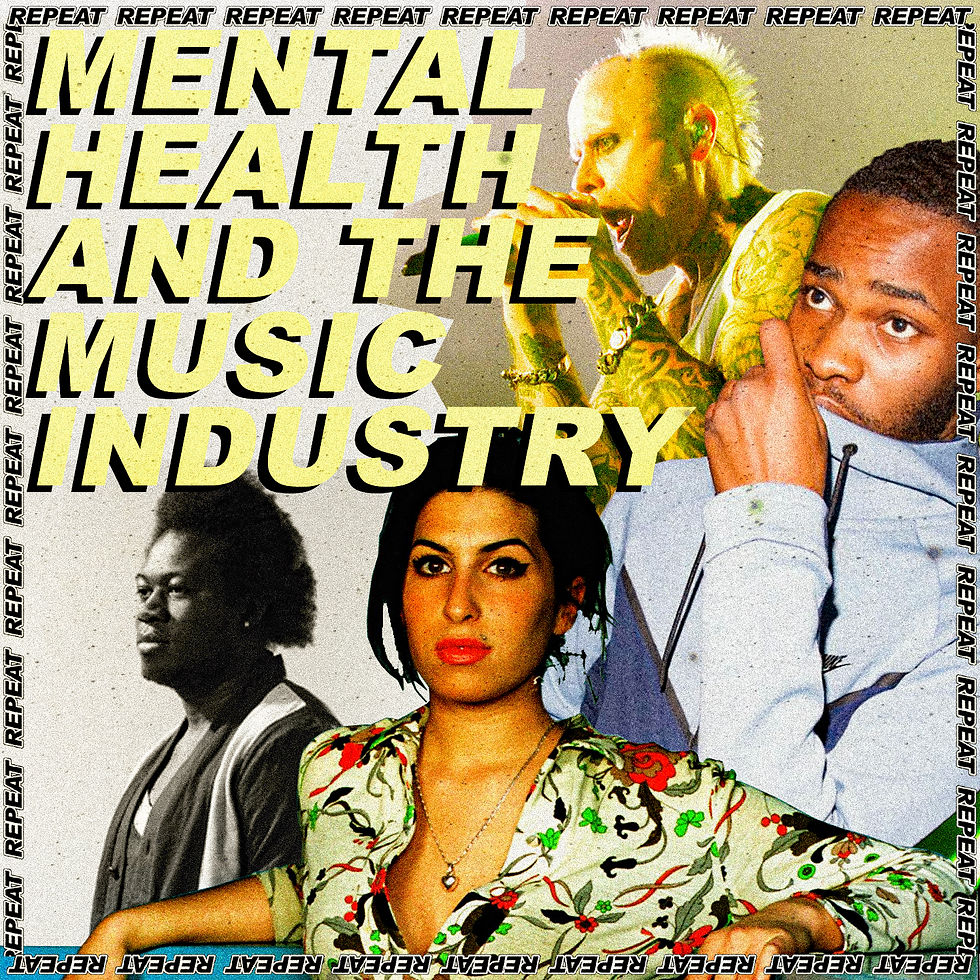
Keith Flint, Amy Winehouse, Mac Miller, who's next on the ever-growing list of suicidal artists? It's time for the music industry to shape up.
The mental state of musicians has been a grey area commonly overlooked by the press; we idolise our favourite artists with such an intensity that it is difficult to process that they too have their own insecurities. In modern hiphop, it is easy - with its hyper-braggadocios lyricism - to presume the toughest of rappers are completely untouchable. But is the genre’s flexing mentality just a coping mechanism for the pain they have suffered to reach the top? Meek Mill has been particularly vocal about the need for therapy in hood based music, comparing his experiences of PTSD as worse than those who fight in the army.
In U.K. based music the narrative of therapy has been particularly prevalent recently; Dave’s Psychodrama uses a psychoanalyst to accentuate his own anxieties from fame. The record soared to number one in England’s album charts, won a Mercury Prize and a Brit Award too. It is becoming more common for sensitive LPs to reach critical, rap acclaim - a trend that is far more prevalent than the genre’s origins.
“It’s like a jungle sometimes, it makes me wonder how I keep from going under” - Grand Master Flash’s contagious hook on The Message could be addressing the poverty of New York’s Bronx, but many have perceived the “jungle” as a metaphor for his mind. As the years have gone by, the lyricism of our favourite artists have become less symbolic, and more impactful: Biggie and Puff Daddy’s ‘Suicidal Thoughts’, 2Pac’s ‘Thugz Mansion’ and Lil Wayne’s Verse on Solange’s ‘Mad’ are just a handful of examples that illustrate the struggles stardom brings to the mentality of each generation’s most esteemed artists.
Writing songs and producing beats has long served as a peaceful remedy for musicians who suffer from mental health issues. However, the better an artist gets, and the more successful they become, coincides naturally with a rise in fame. Skepta found inner peace on Blacklisted, which many fans consider to be his best body of work. He has spoken out about dealing with taunts for his African heritage, and struggling to fit in from a young age - now his illness stems from the commercial achievements of Konnichiwa and Ignorance Is Bliss.
Benga, one of the pioneers in Croydon’s dubstep scene, was diagnosed with bi-polar disorder and schizophrenia after a relentless period of touring and drug taking. Breaking down, and being assigned to a psychiatric unit, were the consequences of his provocative lifestyle. It was not until 2018, 4 years after realising his issue, that we heard new music from the former Magnetic Man member.
The Londoner made ‘Psychosis’ whilst in recovery: “Maybe it’s crazy music and everyone will go: ‘Yeah, he was ill when he made this,’ [laughs] or maybe people will be into it. But if I hadn’t have had that, I could see myself drowning”. Benga found the creative process therapeutic, and continues to speak on his issues to break the stigma around mental health.
Record labels historically haven’t helped the welfare of artists enough, which is one of the many reasons musicians suffer from mental health issues. Thriving off their art, with little in return, it is no wonder ‘getting signed’ doesn’t have the same appeal as it did decades ago. Record Union reported 73% of musicians show signs of mental health problems, so why are labels not providing enough support for their well-being?
Royal Mountain Records—the Canadian label home to Mac DeMarco, Alvvays, U.S. Girls, and more —announced last February that they would be offering $1,500 to each individual musician on their roster for mental health and addiction-related services. As an independent company, they are leading by example, but the world’s biggest labels are failing to confide in their goodwill.
New research into Covid-19’s effects on mental health suggests the pandemic has caused a significant spike in depression. 10% of the UK’s unemployed population believe nothing can help them to overcome the stress they have felt since they lost their job. We have always looked to music as a form of escapism, a way to forget about any issues one may have with life’s challenges. In light of mental health week, we wanted to highlight the importance in kicking back and listening to your favourite track, album, playlist or radio show.
Doing this without a phone might be a challenge to everyone’s social media dependent lifestyle, but it is no secret that networking apps can create a lot of stress for the mind. Jon Hopkins recently released ‘Singing Bowl (Ascension)’ - a 20 minute composition to aid deep meditation. Using an 100 year old antique he discovered in Delhi, the track is both therapeutic and sonically healing.
Music and meditation go hand in hand. Dopamine, a chemical messenger our brain uses to help us feel good, is released 9% more when people listen to songs they like. Adding both activities into your routine may just be what you need in lockdown - whether you find yourself down from losing your job, failing an exam or missing your mates.
Listen to our carefully curated ISOLATION//MEDITATION playlist below
If you find yourself personally suffering from any issues, and the meditation isn't working, their are some great schemes that use electronic music as a form of recovery. Modulate Music look at restoration "through sound and collaboration” - hoping to integrate and rehabilitate those who partake in their course.
Comments